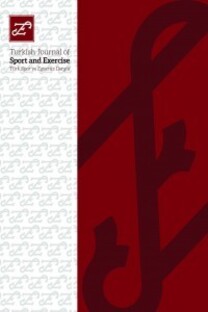Analysıs on Lıfe Satısfactıon of Swımmers
Swimming,
___
- REFERENCES1. Akandere M, Acar M, Baştuğ G. Zihinsel ve Fiziksel Engelli Çocuğa Sahip Anne ve Babaların Yaşam Doyumu ve Umutsuzluk Düzeylerinin İncelenmesi. Selçuk University Sosyal Bilimler Enstitüsü Dergisi, 2009; 22:23-32.2. Ardahan F. Doğa Yürüyüşü Yapanların Yaşam Doyum Düzeyleri ile Duygusal Zekâ ve Yaşam Doyumu Arasındaki İlişkinin İncelenmesi. Mediterranean Journal of Humanities. 2012; II/1:11-19.3. Aydıner BB. Üniversite Öğrencilerinin Yaşam Amaçlarının Alt Boyutlarının Genel Öz-Yeterlik Yaşam Doyumu ve Çeşitli Değişkenlere Göre İncelenmesi. Sakarya University Institute of Educational Sciences. Eğitimde Psikolojik Hizmetler Ana Bilim Dalı. Master’s Thesis. Sakarya. 2011.4. Cenkseven F, Akbaş T. Üniversite Öğrencilerinde Öznel ve Psikolojik İyi Olmanın Yordayıcılarının İncelenmesi. Türk Psikolojik Danışma ve Rehberlik Dergisi, 2007; 3 (27):43-65.5. Cheung HY, Chan AWH. The Effect of Education on Life Satisfaction Across Countries. Alberta Journal of Educational Research, 2009; 55 (1).124-136.6. Chow HPH. Life Satisfaction among University Students in a Canadian Prairie City: a Multivariate Analysis. Social Indicators Research, 2005; 70:139-150.7. Christopher JC. Situating Psychological Well-Being: Exploring the Cultural Roots of İts Theory and Research. Journal of Counseling & Development, 1999; 77 (2):141-152.8. Crews DJ, Landers DM. A Meta-Analytic Review of Aerobic Fitness and Reactivity to Psychosocial Stressors. Medicine and Science in Sports and Exercise, 1987; 19:114-120.9. Diener E, Emmons RA, Laresen RJ, Griffin, S. The Satisfaction with Life Scale. Journal of Personality Assessment, 1985; 49:71-75.10. Diener E, Lucas RE. Subjective Well-Being: Three Decades of Progress. Psychological Bulletin, 1999; 125 (2):276-303.11. Diener E, Seligman MEP. Very Happy People. Psychological Science, 2002; 13(1):81-84.12. Doğan B, Moralı S. Üniversite Öğretim Elemanlarının Sporla İlgili Tutumları İle Yaşam ve İş Doyum Düzeylerinin Spor Yapma Alışkanlıkları İle İncelenmesi. Cbu Beden Eğitimi ve Spor Bilimleri Dergisi, 1999; 3 (1):16-27.13. Doğu G. Sporun Sosyal ve Ekonomik Faydaları. http://www.sporbilim.com/sayfa.asp?mdl=haber¶m=123, 2006: Access Date: 26.11.2018.14. Erkal M. Sosyolojik Açıdan Spor. Kutsun Matbaası. İstanbul, 1992.15. Ergin A, Hatipoğlu C, Bozkurt Aİ, Bostancı M, Atak BM., Kısaoğlu S, Parasız S, Kaygısız H, Çınarlık A, Karasu E. Tıp Fakültesi Öğrencilerinin Yaşam Doyumu ve Öz-Bakım Gücü Düzeyleri ve Etkileyen Faktörler. Pamukkale Tıp Dergisi,2011;4(3):144-151.16. Gandelman N, Piani G. Quality of Life Satisfaction among Workers and Non-Workers in Uruguay. Social Indicators Research, 2013; 111 (1):97-115.17. Gökçe H. Serbest Zaman Doyumunun Yaşam Doyumu ve Sosyo-Demografik Değişkenlerle İlişkisinin İncelenmesi. Pamukkale University Institute of Sports Sciences Department of Psycho-Social Fields in Sports. Master’s Thesis. Denizli, 2008.18. Görgüt İ, Güllü M, Güzel C. Comparison Coping Ways of Athletes and Sedanters. Series Physical Education and Sport/Science, Movement and Health, 2012; 7 (1):72-77.19. Hanbay E, Keskin B, Kahraman M. Spor Yapan Bireylerin Yaşam Doyumlarının Araştırılması. Uluslararası Sosyal Araştırmalar Dergisi, 2017; 10 (51):1305-1313.20. Ilkım M, Kalaycı MC, Güleroğlu F, Gündoğdu C. Down Sendromlu Çocuklarda Sportif Etkinliklere Katılma Durumuna Göre Sosyal Uyum ve Beceri Düzeyinin İncelenmesi, İnönü University Uluslararası Sosyal Bilimler Dergisi, 2018;7 (1):162-172. 21. Ilkım M, Tanir H, Özdemir M. Socialization Effect of Physical Activity in Students Who Need Special Education. Asian Journal of Education and Training, 2018; 4 (2):128-131.22. Kumartaşlı M. İlköğretim İkinci Kademe Öğrencilerinin Beden Eğitimi Dersine Yönelik Tutumlarının ve Yaşam Doyum Düzeylerinin İncelenmesi. Gazi University Institute of Educational Sciences Department of Physical Education and Sports Teaching. PhD Thesis. Ankara, 2010.23. Kaygusuz Ş, Körmükçü Y, Adalı H. Beden Eğitimi ve Spor Yüksekokulu Öğrencilerinin Yaşam Doyum Durumları İle Sporda Görev ve Ego Yönelimi Durumlarının Bazı Değişkenler Tarafından İncelenmesi. International Journal of Science Culture and Sport, 2016; 4 (Special Issue 3):852-863.24. Korkmaz M, Germir HN, Yücel AS, Gürkan A. Yaşam Memnuniyeti Üzerinde Etkili Olan Sosyodemografik Bileşenler Üzerine Bir Analiz, Uluslararası Hakemli Psikiyatri ve Psikoloji Araştırmaları Dergisi, 2015; (3):78-111.25. Köker S. Normal ve Sorunlu Ergenlerin Yaşam Doyumu Düzeyinin Karşılaştırılması. Ankara University Institute of Social Sciences Department of Psychological Services in Education. Master’s Thesis. Ankara, 1991.26. Moller V. Life Satisfaction and expectations for the Future in Sample of University Students: A Research Note. South African Journal of Sociology, 1996; 27 (1):109-125.27. Özdemir M, Tanır H, Ilkım M, Șeker T. Sports injuries in 15-17 year-old male athlete students participating on school teams. Turkish Journal of Sport and Exercise, 2018; 20 (2): 44-48.28. Özer M, Karabulut Ö. Yaşlılarda Yaşam Do¬yumu. Geriatri, 2003; 6 (2):72-74.29. Özkara AB, Kalkavan A, Çavdar S. Spor Bilimleri Alanında Eğitim Alan Üniversite Öğrencilerinin Yaşam Doyum Düzeylerinin Araştırılması. International Journal of Science Culture and Sport, 2015; Special Issue 3:336-346.30. Tekin M, Güllü M. Examined of Creativity Level of Primary School Students Who Make Sports and do not Make Sports. Procedia - Social and Behavioral Sciences, 2010; 2(2): 3351-3357.31. Toros T, Akyüz U, Bayansalduz M, Soyer F. Görev ve Ego Yönelimli Hedeflerin Yaşam Doyumu İle İlişkisinin İncelenmesi (Dağcılık Sporu Yapanlarla İlgili Bir Çalışma). Uluslararası İnsan Bilimleri Dergisi, 2010; 7 (2):1039-1050.32. Toy A.B. Serbest ve Grekoromen Stil Güreşçilerin Hedef Yönelimi ve Yaşam Doyumu İlişkisi. Hitit University Institute of Social Sciences Department of Physical Education and Sports. Master’s Thesis. Çorum, 2015.33. Tuzgöl Dost M. Üniversite Öğrencilerinin Yaşam Doyumunun Bazı Değişkenlere Göre İncelenmesi. Pamukkale University Eğitim Fakültesi Dergisi, 2007; (2) 22:132-143.34. Yetim Ü. Kişisel Projelerin Organizasyonu ve Örüntüsü Açısından Yaşam Doyumu. Ege University Institute of Social Sciences Department of Psychology. PhD Thesis. İzmir, 1991.35. Yılmaz E, Altınok V. Okul Yöneticilerinin Yalnızlık ve Yaşam Doyum Düzeylerinin İncelenmesi. Kuram ve Uygulamada Eğitim Yönetimi, 2009; 15 (59):.451-469.
- Başlangıç: 1999
- Yayıncı: Selçuk Üniversitesi, Spor Bilimleri Fakültesi
Ali TURKER, Oğuzhan YUKSEL, Sinan AKIN
The effect of physical activity on level of anger among individuals with autism
İbrahim BOZKURT, Mehmet Özdemir, Mehmet ILKIM, Halil TANIR
Comparison of physical fitness of turkish and iraqi sedentary boys
Harun GENÇ, Gökmen KILINÇARSLAN, KaraemAli GHAZWAN
The comparison of tibial torsion angles between elite athletes and sedentary people
Ahmet BAYRAK, Galip Bilen KÜRKLÜ, Işık TUNCER, Melda Pelin YARGIÇ
Technical analysis of 2007 and 2017 World Taekwondo Women and Men championship finals
Examination of the service quality perception in private and public sports centers: Konya example
The influence of creatine use on performance of swimmers
Osman İMAMOĞLU, Erkut TUTKUN, Tülin ATAN, Hakan Acar
Comparison of gross motor development of 3-7 years old children in different geographical regions
